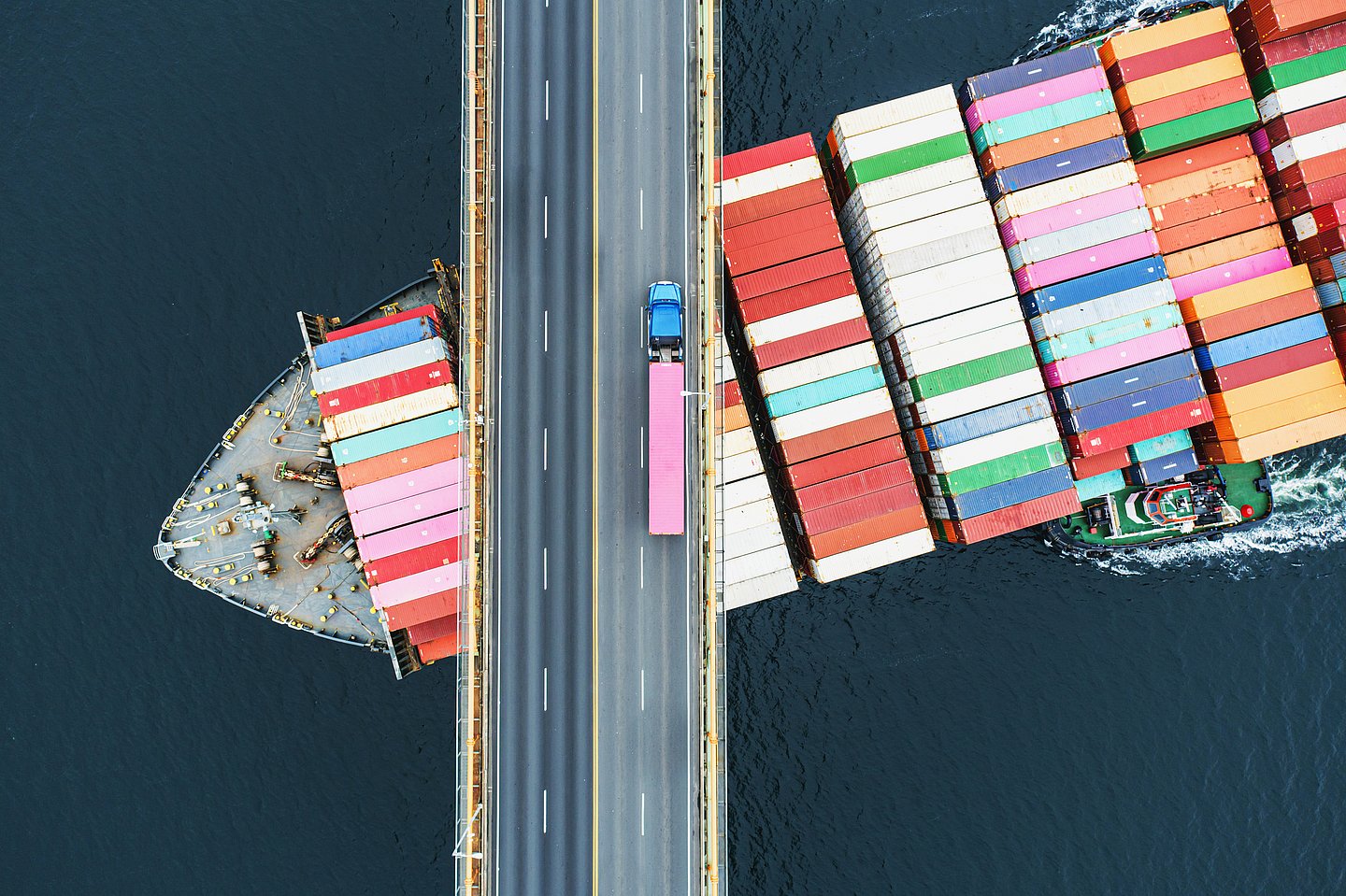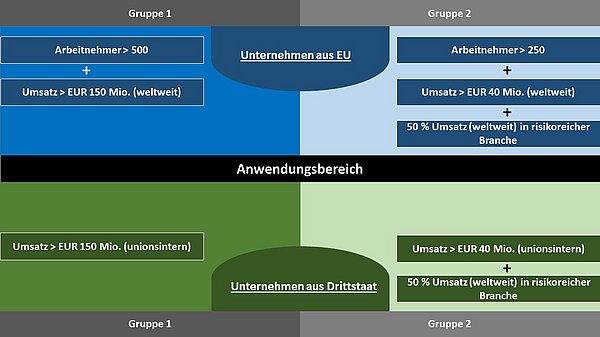The Supply Chain Due Diligence Act requires companies to prevent or mitigate human rights risks and environmental risks in their business operations and supply chains, as well as to terminate violations of human rights or environmental obligations.
The provisions of the Supply Chain Due Diligence Act initially apply only to large German and foreign corporations with at least 3,000 employees in Germany and a registered office, principal place of business, or branch in the country. This threshold will decrease to 1,000 employees beginning on January 1, 2024.
The law defines the “supply chain” as beginning with the extraction of raw materials and concluding with delivery end consumer. In general, businesses are responsible only for their own business area and direct suppliers. In cases where a complaint is discovered in the supply chain that can be traced back to the actions of only an indirect supplier, however, the companies are also required to take corrective action.
To comply with their human rights and environmental due diligence obligations under the Supply Chain Due Diligence Act. affected businesses must
- implement a risk management system,
- define appropriate internal responsibilities, such as appointing a human rights officer,
- perform risk assessments routinely,
- issue a policy statement,
- anchor prevention schemes within its own business area and with direct suppliers,
- take corrective action as required,
- establish a complaints procedure, and
- implement documentation and reporting procedures.
Compliance with the obligations of due diligence is ensured by extensive monitoring and sanction mechanisms. In the event of a violation of the Supply Chain Due Diligence Act’s corporate due diligence requirements, the affected companies face hefty fines. Infringements may incur fines of up to EUR 8 million, depending on the gravity and significance of the allegation and the specifics of the case. Sales-related penalties of up to 2% of average annual sales can be imposed on companies with global annual sales in excess of EUR 400 million. In addition, public contract exclusion may be considered as a sanction.
In the past, the transgression of human rights-protected legal positions presented a significant reputational risk for businesses. The new Supply Chain Due Diligence Act has heightened the importance of supply chain compliance for businesses. The measures outlined by the legislator must be implemented expeditiously and consistently by affected companies.
Guide on the principle of appropriateness as required by the Supply Chain Due Diligence Act
On December 23, 2022, the German Federal Office for Economic Affairs and Export Control (BAFA) published another “Guide on the principle of appropriateness as required by the Supply Chain Due Diligence Act.”
The Supply Chain Due Diligence Act requires businesses to act “appropriately” at multiple points in the text, including when conducting the risk analysis required by the Act, risk management, preventive and corrective measures, and the complaints procedure. In addition, BAFA verifies whether companies have “adequately” implemented the Supply Chain Due Diligence Act’s requirements.
The principle of appropriateness provides companies with the discretion and wiggle room necessary for implementing their due diligence obligations – which risks a company must address, in what order, and with what level of urgency depends on the specific company and risk situation. This ensures that the legislator did not have unreasonable expectations of the companies. The type and manner of appropriate efforts may vary from company to company, so long as the appropriateness criteria are adhered to consistently.
BAFA’s most recent guide explains this tenet of the Supply Chain Due Diligence Act and provides information on a variety of implementation tools. The document provides examples, guiding questions, and overviews for the individual due diligence requirements to assist companies in applying the principle of adequacy in practice.
BAFA’s questionnaire on reporting under Section 10(2) Supply Chain Due Diligence Act
The Federal Office for Economic Affairs and Export Control (BAFA) released a list of queries for the compilation of the annual report on meeting corporate due diligence obligations under Section 10(2) Supply Chain Due Diligence Act on October 14, 2022.
The questionnaire, which currently consists of 437 multiple-choice questions, assists businesses in implementing the legal requirements of the Supply Chain Due Diligence Act and enables them to determine whether, and if so, to what extent, they are already meeting their corporate due diligence obligations under the Supply Chain Due Diligence Act, or whether further action is required. Thus, the catalog is simultaneously an important check of one’s own efforts to comply with due diligence requirements.
This article provides a comprehensive presentation and evaluation of the questionnaire, as well as recommendations for practice.
The second BAFA guide on the organization, implementation, and evaluation of Supply Chain Due Diligence Act complaint procedures
In October 2022, the Federal Office for Economic Affairs and Export Control (BAFA) issued another guide, titled “Complaints Procedure under the Supply Chain Due Diligence Act.”
BAFA intends to assist obligated companies in implementing this due diligence requirement of the Supply Chain Due Diligence Act. The guide explains the Supply Chain Due Diligence Act’s requirements for the organization, implementation, and evaluation of the complaints procedure. Companies are provided with specific and useful suggestions for carrying out the corresponding obligations.
This article contains a presentation and evaluation of the content of this document, as well as recommendations for practice.
In addition, we implement all special requirements of the German Supply Chain Due Diligence Act, as outlined in the BAFA’s guide, as well as the soon-to-be-enacted legal requirements of the Whistleblower Protection Act and other regulations on the establishment of whistleblower systems for our clients using our own whistleblower and complaint system, the award-winning LegalTech tool WhistleFox, in a legally compliant, appropriate and practical manner!
BAFA’s initial publication on risk analysis under the Supply Chain Due Diligence Act
The Federal Office for Economic Affairs and Export Control (BAFA) published its first Guide for implementing a risk analysis in conformance with the requirements of the Supply Chain Due Diligence Act on August 17, 2022. The guide provides a summary of the essential requirements of the Supply Chain Due Diligence Act for risk analysis as well as assistance and practical suggestions for the implementation of the risk analysis by the affected companies.
This article contains a presentation and evaluation of the contents of this document, as well as recommendations for practice.
Draft European Supply Chain Act – EU Commission proposes substantially more stringent regulations
On February 23, 2022, the European Commission adopted a proposal for a Directive on corporate sustainability due diligence.
The aim of this Directive is to foster sustainable and responsible corporate behavior across all global value chains. In numerous respects, the draft substantially exceeds the German Supply Chain Due Diligence Act.
The draft Directive enlarges the scope of the new regulations compared to the Supply Chain Due Diligence Act. Companies that meet the following criteria are affected:
Member States are responsible for ensuring that companies adhere to their human rights and environmental due diligence obligations. In accordance with the German Supply Chain Due Diligence Act, the proposed legislation includes a list of six specific steps.
With its proposed Directive, the EU Commission also focuses on combating climate change. Companies must employ a plan to ensure that their business model and strategy are compatible with the limiting of global warming to 1.5°C.
When setting the variable remuneration of management, compliance with the new climate obligations should also be duly taken into account.
The violation of the Directive will result in sanctions based on the company’s annual revenue. In addition, Member States are required to publish sanction decisions.
In contrast to the German Act, full civil liability for damages is provided. Damages arising from failure to comply with the preventive and corrective measures would have to be compensated.
The proposal will now be submitted for ratification to the European Parliament and Council. The Member States will have two years to transpose the Directive into national law after its adoption. In Germany, the Directive is anticipated to result in a significant modification of the Supply Chain Due Diligence Act’s provisions.
The lawyers in our Corporate Social Responsibility (CSR) Taskforce advise businesses, public institutions, and organizations in all areas of the dynamic and contemporary business, environment, and human rights fields.
Our services include the following:
Ongoing advice and monitoring of the legal situation
We provide an overview of the existing national, European, and international legal requirements for sustainable business and keep you abreast of all current legislative activities that affect your business.
In addition, we advise you on how to take the right steps early on to implement the legal requirements in the areas of CSR, human rights, social standards, sustainability, and the environment in your company effectively and economically, and to avoid (potentially sanctionable) violations.
Implementation of due diligence
We evaluate your due diligence obligations and assist you in establishing, implementing, and updating the appropriate measures so that your business does not have to face negative consequences such as liquidated damages, fines, or exclusion from public contracts.
We also offer training, workshops, and qualification schemes on the aforementioned topics for your company’s employees and managers who are responsible for and concerned with these issues.
Risk management and risk analysis
We assist our clients with (updating) risk analysis and the establishment of an appropriate risk management system.
Together, we evaluate the steps your business has taken to date to meet legal and contractual sustainability requirements.
We examine the steps your company must take to comply with the new Supply Chain Act requirements and the requirements for sustainable corporate governance.
Compliance, risk, and supply chain management system
We design and implement effective compliance and risk management systems to observe due diligence obligations in global supply chains, or we support the expansion of existing systems to include the “supply chain compliance” element.
We draft individualized sets of rules and codes of conduct (supplier codes of conduct, business codes, CSR agreements, statements of human rights principles).
In addition, we devise a concept for rule-compliant supply chain management for your organization, define your future supply chain policy, and implement early warning systems.
On request, we also assess and modify your distribution and supply contracts in accordance with compliance, CSR, and sustainability requirements.
Reporting and notification
We collaborate with you to develop and implement a suitable sustainability and CSR reporting and notification system to customers, authorities, and the general public that complies with legal requirements and supports the positive corporate communications of your business.
Crisis management and legal representation
We represent you in court and out-of-court legal disputes, as well as regulatory proceedings involving human rights violations, due diligence violations, and supply chain disputes. This includes strategic advice prior to such disputes, so that you are always in the best position possible.
We advise you on matters concerning the liability of your general managers and board members in the event of due diligence violations. We also defend and represent companies and their management personnel in criminal or administrative proceedings, as well as in the event of a civil claim.
If there are indications that, for instance, one of your business partners has violated relevant obligations (possibly at your company’s expense), and you wish to take legal action, we will advise you on the filing of criminal charges or reports with the appropriate regulatory authorities.
We also advise you on all CSR-related issues pertaining to your company’s reputation and assist you with crisis management.

![[Translate to English:]](/fileadmin/_processed_/7/5/csm_Schork__Dr._Christoph_print_25944edbfb.jpg)



![[Translate to English:]](/fileadmin/_processed_/d/5/csm_Glander__Anna-Lena_print_031f436e1d.jpg)

![[Translate to English:]](/fileadmin/_processed_/7/8/csm_Stroehmann__Dr._Martin_print_a54b0ff5af.jpg)
